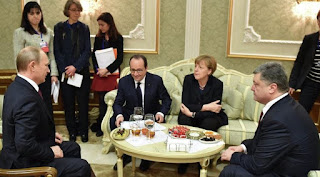 In 1964, in the lead up to the British election, Harold Wilson (left) is supposed to have coined the famous phrase, ‘A week is a long time in politics.’
In 1964, in the lead up to the British election, Harold Wilson (left) is supposed to have coined the famous phrase, ‘A week is a long time in politics.’ It is now a week since the election of Donald Trump to the presidency of the US, and the international reverberations of his election to the most powerful political office in the world has brought Harold Wilson's famous phrase vividly to life.
It is now a week since the election of Donald Trump to the presidency of the US, and the international reverberations of his election to the most powerful political office in the world has brought Harold Wilson's famous phrase vividly to life.For Ukraine it spells possible disaster.
Already Trump's first official appointments are causing some consternation.
As reported by the BBC,
 "Reince Priebus (bottom left), chairman of the Republican National Committee (RNC), will be his chief of staff.
"Reince Priebus (bottom left), chairman of the Republican National Committee (RNC), will be his chief of staff.In this role, he will set the tone for the new White House and act as a conduit to Congress and the government.
Stephen Bannon (top left), from the Breitbart News Network, will serve as Mr Trump's chief strategist." (BBC News : 14/11/2016)
 Given that Stephen Bannon was Trump's campaign chief, we should all wonder at the recent revelation from Dmitry Peskov (right) that,
Given that Stephen Bannon was Trump's campaign chief, we should all wonder at the recent revelation from Dmitry Peskov (right) that,"...Peskov said Russian experts were in contact with some members of Trump’s staff during the campaign, but he reiterated that the Russian government and security agencies had nothing to do with the cyberattacks. A Trump spokeswoman denied there were any contacts between the campaign and “any foreign entity.” (WTOP (Associated Press) : November 10, 2016) (my emphasis)
Even more disconcerting,
"Peskov said the two leaders are “very much alike … in their basic approaches toward international affairs.” He noted that Putin and Trump had used almost the same language in recent weeks to stress that their country came first but they were ready to have good relations with the rest of the world." (ibid WTOP) (my emphasis)
Which rather puts into perspective the fact that,
 "Ukrainian President Petro Poroshenko congratulated Donald Trump on his
election win by inviting the newly minted U.S. president-elect to visit
the war-torn, Eastern European country." (UT :
"Ukrainian President Petro Poroshenko congratulated Donald Trump on his
election win by inviting the newly minted U.S. president-elect to visit
the war-torn, Eastern European country." (UT : Nov. 11, 2016) (my emphasis)
With Stephen Bannon now esconced as Trump's chief strategist, who must have been aware that Russian experts were in contact with some of Trump's staff during the election campaign and who did NOTHING to stop these contacts, the very idea of Trump taking up Poroshenko up on his invitation about visiting Ukraine is vanishingly small.
Such optimism on the part of Poroshenko stems primarily from the fact that whilst Trump may have lauded Putin as a 'strong' leader, it is believed that Putin will not be able to confront Trump threateningly as he has done with Obama.
For Putin, Trump is a 'wild card'.
And whilst the eyes of the world are focussed on Donald Trump,
"Russia has been preparing a large-scale action to destabilize the situation in Ukraine starting from November15, head of the national statehood protection department of Ukraine's Security Service (SBU) Anatoliy Dublik told journalists in Kyiv on Friday." (UT : Nov. 11, 2016) (my emphasis)
Will Putin now set in motion his final act of the total destabilization of Ukraine, before he has to confront president-elect Donald Trump?
(to be continued)
















































